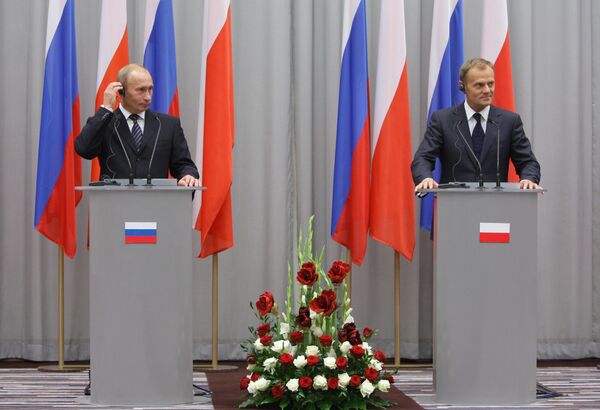SOPOT, September 1 (RIA Novosti) - Russian Prime Minister Vladimir Putin told his Polish counterpart on Tuesday that the two countries must not let disputes over World War II get in the way of building relations.
Putin met with Donald Tusk at the seaside resort of Sopot near Gdansk, which is hosting ceremonies to mark the 70th anniversary of the outbreak of the war.
At least 20 world leaders gathered in Gdansk to remember September 1, 1939 when Nazi Germany attacked Poland, triggering the bloodiest conflict known to mankind. Poland and some ex-Soviet states blame a deal between Stalin and Hitler for the start of hostilities.
"As to what preceded the tragedy, that should be left to the experts to determine," Putin told Tusk. "We must understand what triggered the start of the war, and move on."
Russia has strongly resisted attempts to portray the Soviet Union as an aggressor in the war, in which it lost at least 27 million people. The 1939 Molotov-Ribbentrop Pact is believed by many to have opened the way for the invasion of Poland and the ensuing world war.
Speaking at a news conference after the talks, Tusk reiterated his government's official position: "The Molotov-Ribbentrop pact led, in one way or another, to the aggression against Poland. Germany attacked Poland on September 1, and two weeks later Stalinist Russia's troops came from the east."
Putin argued that it was unfair to claim the pact acted as the sole trigger for the war.
He urged for an unbiased approach to history: "We all have made a lot of mistakes. All of them contributed to the start of the large-scale aggression by Nazi Germany."
In an article published ahead of his Polish visit, Putin condemned the deal with Hitler, in which two countries pledged neutrality and agreed in a secret protocol to divide Northern and Eastern Europe, including Poland, into spheres of influence.
But Putin recalled the 1938 Munich treaty between major European powers and Hitler, which permitted the German annexation of Czechoslovakia's Sudetenland. He said Poland then sent its troops into Czech provinces.
Putin and Tusk also agreed that groups of historians would study the 1940 massacre of Polish officers and others in Katyn, western Russia, another sore point in the two countries' relations.
"Great nations must not be afraid of the truth," Tusk said. "Nobody in Poland has forgotten how much blood Soviet soldiers poured liberating Poland from Hitler's occupation."
The premier said Soviet troops liberated Poland, but could not give it freedom, referring to the Communist regime introduced in the country by the Soviets.
ENERGY
Tusk acknowledged the recent improvements in relations. "Relations between Poland and Russia are better now than ever. Although the crisis has led to a decline in [trade] turnover, we want the dynamics to be stronger."
Tusk said he and Putin agreed that energy must not be linked to politics. He said Poland looks to signing a new contract on Russian natural gas supplies this fall.
Poland consumes some 14 billion cubic meters of gas a year, 6.2 billion of which it imports from Russia. The country's own production stands at 4.2 billion cu m.
Putin, on his part, urged a corruption probe into the joint venture running the gas pipelines in Poland, expressing concerns about its ownership structure.
Russia and Poland signed several agreements on Tuesday, including on imports of spent nuclear fuel from Poland, shipping in Russia's and Poland's Baltic Sea waters, and on cultural cooperation.
Tusk said they did not raise Nord Stream at Tuesday's talks, but added he was skeptical about the gas pipeline to be built on the Baltic seabed, referring to economic and environmental aspects of the project.
He said the pipeline, which will pump gas directly to Western Europe bypassing Poland, was not "an important element in our relations."




